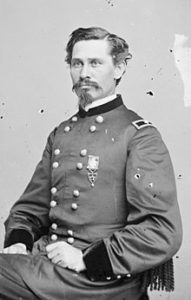 Orlando Metcalfe Poe (March 7, 1832 – October 2, 1895) was a United States Army officer and engineer in the American Civil War. After helping General William Tecumseh Sherman’s March to the Sea, he was responsible for much of the early lighthouse construction on the Great Lakes and design of the Poe Lock at Soo Locks between lakes Superior and Huron.
Orlando Metcalfe Poe (March 7, 1832 – October 2, 1895) was a United States Army officer and engineer in the American Civil War. After helping General William Tecumseh Sherman’s March to the Sea, he was responsible for much of the early lighthouse construction on the Great Lakes and design of the Poe Lock at Soo Locks between lakes Superior and Huron.
At the start of the American Civil War, Poe assisted in organizing the volunteers from Ohio; later, he was made a member of Maj. Gen. George B. McClellan’s staff in western Virginia and took part in the Rich Mountain campaign. He went with McClellan to Washington and assisted by organizing the defense of the capital. Promoted to colonel of volunteers that September, he was placed in command of the 2nd Michigan Volunteer Infantry Regiment. He commanded them successfully from Yorktown through the Battle of Seven Pines during the Peninsula Campaign; he next was given field command of a brigade prior to the Northern Virginia Campaign of 1862. His brigade anchored the far right of the Union line at the August 29–30 battle of Second Bull Run but was only lightly engaged. Several days later on September 1, Poe and his men participated in the Battle of Chantilly. His brigade was present, but not active during the December 1862 Battle of Fredericksburg.
Poe was appointed brigadier general of volunteers effective November 29, 1862; however, the appointment was rejected by Congress in the spring of 1863. Poe reverted to his old rank of lieutenant in the regular army but was soon promoted to captain and then transferred to the Western Theater. In his capacity as chief engineer of the XXIII Corps, he was a key factor in the defense of Knoxville, Tennessee. This city was successfully defended against a siege led by Confederate Lt. Gen. James Longstreet, which culminated in the November 29, 1863, Battle of Fort Sanders. Due to Poe’s contributions, Maj. Gen. William T. Sherman selected Poe as his chief engineer in 1864. Poe oversaw the burning of Atlanta, for which action he was honored by Sherman. Poe directly supervised the dismantling of all buildings and structures in Atlanta that could have provided any military value to the Rebels once Sherman abandoned the city; rail depots, roundhouses, arsenals and storage areas were manually disassembled and the combustible materials then destroyed by controlled fires (however, Poe was incensed at the level of uncontrolled arson by marauding soldiers not of his unit which resulted in heavy damage to civilian homes.) He continued to serve as chief engineer during Sherman’s March to the Sea. Poe was indispensable (by the commanding General’s own words) during the March, when Sherman cut loose from his supply lines to Chattanooga and headed southeast across the body of Georgia to Savannah, living off the land, to bring fire and pillage to the center of the Confederacy rather than pursue John Bell Hood’s elusive Rebel army, at the time a hotly debated and controversial strategy among the Union high command (aside from such vital targets as Vicksburg, New Orleans, Fort Donelson and the fixation on the capture of Richmond, Union strategy until that time had usually focused on the reduction of Confederate forces, not attacks on territory and infrastructure, and followed established military practices of protected supply lines. Hood eventually headed north toward Nashville on an ill-advised campaign of conquest and was soundly defeated near there by Union forces led by George Thomas). Dozens of river crossings, poor or non-existent roads and the extensive swamps of southern Georgia would have fatally slowed Sherman’s force had not Poe’s skills as leader of the bridge, road and pontoon building units kept the army moving. He also continued to supervise destruction of Confederate infrastructure. Breveted to colonel after the fall of Savannah, he continued in that capacity in the war’s concluding Carolinas Campaign as Sherman headed northwards from Savannah to link up with Grant and the Army of the Potomac in Virginia and to cut another swath through South and North Carolina.[1][2] When the war ended Poe was breveted to Brigadier General in the regular army.[3]
Content retrieved from: https://en.wikipedia.org/wiki/Orlando_Metcalfe_Poe.